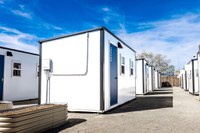Gateway System Adds Recovery Micro-Community
ALBUQUERQUE - Gateway Recovery, the newest addition to the Gateway Network, is complete and will soon provide much-needed recovery housing and addiction treatment for our community.
Gateway Recovery is a micro-community for people with substance use disorder and our unsheltered community to get addiction treatment and interim housing. It’s made up of 46 Pallet Shelter homes. The community will serve up to 50 people at a time in 42 single-occupancy homes and four double-occupancy homes for couples.
There are three on-site community rooms dedicated to behavioral health treatment, substance treatment, case management, housing navigation, workforce training, and more. Residents will have access to a laundry facility and three bathrooms, one of which is wheelchair accessible. People will stay up to 24 months or until they are connected to longer-term recovery housing.
“The Gateway Network is here to meet people where they are with trauma-informed care and wraparound support including addiction treatment,” said Mayor Tim Keller. “By providing stable, recovery housing, we’re creating a safe, healing environment where individuals can begin rebuilding their lives and working toward long-term sobriety.”
This is a topic Donald Hume knows well. Hume is a longtime recovery housing advocate with lived experience.
“I know for me it was very important to have a community of people in recovery that could assist me when everything got hard, that could teach me the skills that I need to be successful. I needed a place where I felt safe and protected, that’s what Gateway Recovery will provide,” said Donald Hume.
The micro-community includes a dog park, because being forced to leave behind a beloved companion can prevent someone from seeking services. It also includes a community garden to create a welcoming environment and foster connection and belonging.
Many decisions in creating the community were based on a study commissioned by the Department of Health, Housing, and Homelessness in June 2024, which found that people exiting substance use disorder treatment who lack stable housing are much more likely to relapse, become homeless, or re-enter the justice system. The study states there are only about 800 recovery beds in Albuquerque, which is not enough to meet our community's needs.
“Through our Recovery Housing Study, we saw an urgent need, and now, thanks to a strong partnership with the County, our vision is coming to life,” said Health, Housing and Homelessness Director, Gilbert Ramirez. “Gateway Recovery will undoubtedly save lives by offering the necessary support to achieve long-term sobriety. There’s more work to do, but today is a step in the right direction.”
Endeavors will operate Gateway Recovery and administer support services. The behavioral health provider, based in San Antonio, Texas, prioritizes pathways to long-term recovery and housing. They will begin accepting referrals to Gateway Recovery on Monday.
Referrals are expected to come from community partners that administer medical detox services, including Bernalillo County CARES Campus Detox. Our goal is to provide a smooth transition into a stable, structured environment that promotes long-term wellness.
Bernalillo County is an integral partner in Gateway Recovery and contributed $1.7 million for construction.
“Gateway Recovery is a powerful example of what’s possible when Bernalillo County and the City of Albuquerque come together to serve our community,” says Commissioner Barbara Baca (D1). “This facility will provide a safe, supportive space for people to begin their recovery journey and take meaningful steps toward a healthier future.”
“Gateway Recovery reflects our commitment to building a full continuum of care that meets people where they are,” says Wayne Lindstrom, Ph.D., deputy county manager for Behavioral Health. “By combining safe, transitional housing with wraparound behavioral health support, we’re giving individuals the stability and services they need to reclaim their lives.”
$5 million in City of Albuquerque Opioid Settlement Funding was also allocated for construction and to begin operations.

